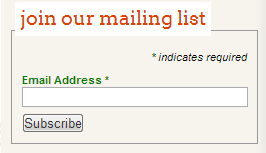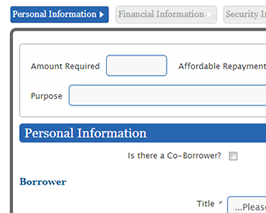Getting The Most From Your Online Form
Sooner or later you’re going to want to put a form on your website. It could be for a survey, a contact form, subscribe to our newsletter, address details for a shopping cart or even a loan application. Each one requiring more or less information to be filled out from the user. It's a fairly usual component of a website but one which few spend enough effort to get right and many overlook some key and fundamental usability requirements.
When a user fills out a form on a website, they begin a transaction using their personal information as currency.
You want their valuable information and they will certainly be wanting something in return. The more information you ask for, the greater the reward or return that must be given as an outcome. It’s important that the transaction be equally balanced or even loaded in favour of the user.

Low value forms
If you're looking to garner subscriptions to your newsletter, your best bet is to only ask for an email address. Anything more and the user may feel like they’re giving away too much personal information. Of course we would like as much information as possible, such as name, address and gender. To gather this amount of personal information the user must feel confident that your newsletter will be of high value to them. For example if you're in the business of selling, it's a good idea to have subscriber only specials, products anouncements and tips that enhance anything already purchased.

High value forms
At the other end of the scale, if the form was for a loan application there is a high motivation for the user to give as much information as possible, because the gain for user is high. They want money they don’t have to buy something they want. You’ve got them cornered. Still, the form then needs to be very carefully constructed to collect to right information and be easy and intuitive to fill out.
Some form tips
Here are some helpful tips for forms on your website:
- Make the transaction balanced (match the information you’re requesting with the return for the user)
- Only ask for information you really need
- Make your questions easy to answer (even I liked multiple choice in school)
- Order the questions like a smooth and logical conversation
- Write useful instructions in plain language when needed
- Incentivise the user if you want to gather more information than they normally would give (everyone loves a competition)
Need some more advice?
If you'd like any assistance with forms on your website please contact us.